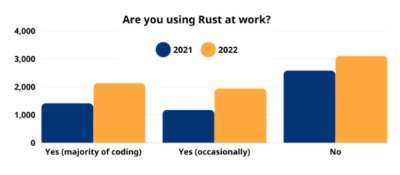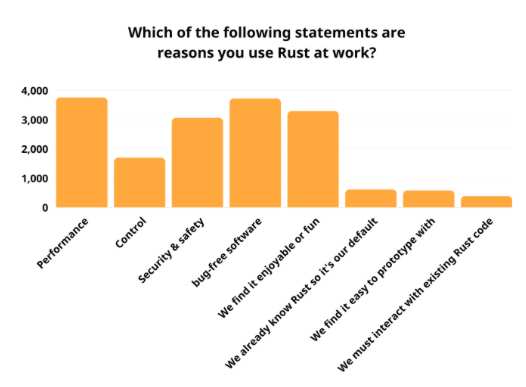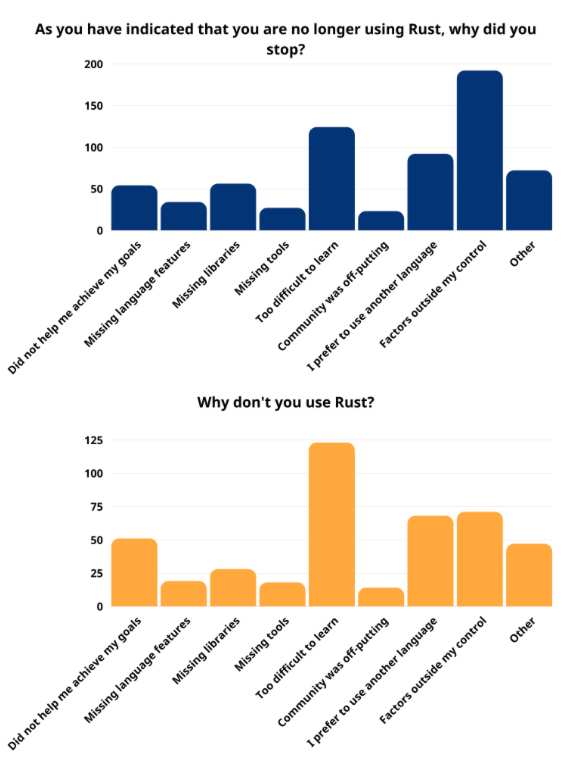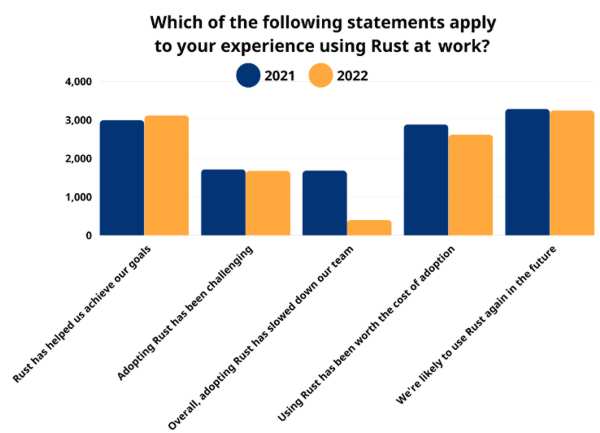| Rust Takes Its Place At Work |
| Written by Sue Gee | |||
| Wednesday, 09 August 2023 | |||
|
Rather later than planned, the results of the latest Rust Developer Survey, which was conducted in December 2022, are out. They show that more people than ever before are using Rust and that around half of users do so on a daily basis.
Introduced in 2010 an alternative to C, Rust was pioneered by Mozilla as a safe, fast and concurrent language. Mozilla parted with its Rust developers over the two rounds of its 2020 layoffs, but by then Rust was ready and able to cope without this support and, as we reported, the Rust Foundation, an independent non-profit organization to steward the Rust programming language and ecosystem, became active at the start of 2021. As well as covering its progress in terms of new release of the Rust language, we also frequently comment on its status, in particular the fact that it has consistently emerged as the "Most-loved" language in Stack Overflow's annual Developer Survey despite only being used by relatively few people. This year Stack Overflow introduced a new metric "Most Admired" revealing that: Rust is the most admired language, more than 80% of developers that use it want to use it again next year. That survey also found that Rust was a language that users of many other languages wanted to try out. In terms of actual usage Rust was used by 12.21% of Professional Developers putting it 14th in the list headed by JavaScript with 65.82%. Rust first achieved the status of being in the Top 20 of the TIOBE Index in June 2020 and has been in and out since. It achieved its highest position, #17 in July 2023 but dropped back to #19 in August 2023. That the use of Rust is increasing is revealed in GitHub's 2022 Octoverse Report which recorded a 50.5% increase year-on-year. The main purpose Rust's own annual survey, which gathers data from project maintainers, contributors, users of Rust and those generally interested in its future, is to discover the extent of usage of the language, the benefits perceived by its users and the factors that cause people to stop using it or inhibit them from adopting it. It began in 2016 and has been held every year since - making this the seventh report on the state of Rust. The 2022 survey had fewer respondents than in 2021 - nearly 11,500 compared to over 12,200. However, more respondents completed the entire survey giving 9,433 total survey completions compared to 9354 in 2021. The survey was available in 11 languages. While 77% completed in English this was the lowest percentage of respondents taking the survey in English to date. The top countries represented were United States (25%), Germany (12%), China (7%), United Kingdom (6%), France (5%). The main finding of the survey, to quote the Rust Survey Team, is: More people are using Rust than ever before! Over 90% of survey respondents identified as Rust users, and of those using Rust, 47% do so on a daily basis – an increase of 4% from the previous year. In terms of proficiency: 30% of Rust user respondents can write simple programs in Rust, 27% can write production-ready code, and 42% consider themselves productive using Rust. The finding that 30% of respondents use Rust for the majority of their coding work at their workplace, a 51.8% increase compared to the previous year, is taken to be a sign of the growing maturation of Rust: Nearly 4000 respondents used Rust at work and they were asked a supplementary question about the reasons for doing so:
Respondents could choose more than one option and the most frequently selected were the perceived ability to write bug-free software (86%), Rust's performance characteristics (84%), and Rust's security and safety guarantees (69%). The Rust Survey Team comments: We were also pleased to find that 76% of respondents continue to use Rust simply because they found it fun and enjoyable. There were also supplementary question for two groups of respondents who didn't use Rust - those who had stopped using it (nearly 400) and those who had never started (nearly 500). Together they account for less than 10 per cent of respondents and the former group is larger than the latter.
Of the former Rust users who completed the survey, nearly half (47%) selected the option "Factors outside my control", while 30% chose "Too difficult to learn". The same two options were chosen by those who hadn't yet used Rust, but in the other order. The perception of the language's difficulty had deterred over a quarter of this group but a much higher proportion just hadn't yet been able to prioritize learning Rust. The Rust Survey Team is aware of the difficulties of learning the language, something probed in a question that the report uses to make a comparison with the previous year. The team's comment is: Like any language being applied in the workplace, Rust’s learning curve is an important consideration; 39% of respondents using Rust in a professional capacity reported the process as “challenging” and 9% of respondents said that adopting Rust at work has “slowed down their team”. However, 60% of productive users felt Rust was worth the cost of adoption overall. What I would add is that in 2022 the proportion of those who selected the negative response "Overall adopting Rust has slowed down our team" reduced dramatically. In both years around two thirds of respondents selected "We're likely to use Rust again in the future" which should be regarded as positive endorsement of Rust and is in keeping with the enthusiasm we've seen for Rust from other sources.
More Information2022 Annual Rust Survey Results Related ArticlesRust Use Continues To Increase Rust Use Continues To Increase Rust Survey Revelations (2018) Rust Team Announces Rust Foundation Google Says You Got Rust Wrong - It's Great! To be informed about new articles on I Programmer, sign up for our weekly newsletter, subscribe to the RSS feed and follow us on Twitter, Facebook or Linkedin.
Comments
or email your comment to: comments@i-programmer.info |
|||
| Last Updated ( Wednesday, 09 August 2023 ) |







